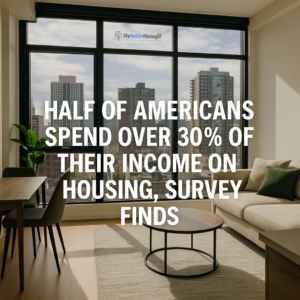The American dream of owning or renting a home without financial stress is becoming harder to achieve. A recent survey by NerdWallet has found that about half of Americans spend over 30% of their pre-tax income on housing costs, surpassing the widely recommended benchmark of affordability (kplctv.com).
This 30% threshold, long used by financial planners and housing experts, marks the point where households are considered “cost-burdened.” The findings raise concerns about the state of housing affordability, especially in the wake of rising interest rates, increasing rents, and stagnating wages.
The Key Findings of the Survey
According to the survey, nearly 50% of U.S. households are paying more than the recommended limit for housing expenses. These expenses include:
-
Rent or mortgage payments
-
Property taxes and insurance
-
Homeowners’ association fees (if applicable)
-
Utilities (water, electricity, gas, internet)
The report also highlights:
-
Renters are disproportionately affected. Nearly half of all renters are cost-burdened, compared to roughly one-quarter of homeowners.
-
Young adults and first-time buyers face steeper challenges due to student debt, high property prices, and stricter lending requirements.
-
Metropolitan areas especially cities like Los Angeles, New York, Miami, and San Francisco have cost burdens far exceeding the national average.
Why the 30% Rule Matters
The 30% rule comes from guidelines established by the U.S. Department of Housing and Urban Development (HUD), which classifies households that exceed this limit as “cost-burdened,” while those spending more than 50% of income on housing are considered “severely cost-burdened.”
Why it’s important:
-
Financial instability: Spending too much on housing reduces funds available for savings, healthcare, debt repayment, and emergencies.
-
Limited upward mobility: Cost-burdened households often face barriers to education, retirement planning, and investments.
-
Heightened stress: According to other studies, financial strain is one of the leading causes of anxiety and even relationship challenges.
Why Are Housing Costs So High?
Several factors contribute to the current housing affordability crisis:
-
Rising interest rates: Higher mortgage rates have increased the monthly payments for homeowners.
-
Low housing inventory: A shortage of homes for sale or rent has pushed prices up.
-
Construction costs: Increased labor and material costs make building affordable housing more difficult.
-
Wage stagnation: While housing costs have risen, incomes have not kept pace.
-
Urban demand: More people are moving to cities, where rents and home prices are often the highest.
What Experts Recommend
Holden Lewis, a housing expert at NerdWallet, emphasizes that while staying under the 28–30% rule is ideal, it’s not always possible in today’s market. He advises:
-
House hacking: Renting out a room or basement to offset costs.
-
Downsizing: Considering smaller or less centrally located homes to reduce expenses.
-
Comparison shopping: Regularly reviewing insurance policies and utility providers to find lower rates.
-
Refinancing when possible: Taking advantage of lower interest rates if they drop.
Strategies for Renters and Homeowners
For Renters:
-
Negotiate your lease renewal or explore rental assistance programs.
-
Look into rent-stabilized units if available in your area.
-
Consider co-living or sharing space to divide costs.
For Homeowners:
-
Reevaluate mortgage options and refinancing opportunities.
-
Conduct an energy audit to reduce utility bills.
-
Look into property tax exemptions or rebates for which you might qualify.
The Bigger Picture
The affordability crisis isn’t just a personal challenge; it’s a systemic issue. Experts call for:
-
Affordable housing policies: Local governments must incentivize developers to build affordable units.
-
Zoning reforms: Easing restrictions can encourage the creation of multi-family housing.
-
Rental assistance programs: Expanding federal and state programs to help low-income renters.
-
Increased wage growth: Ensuring that wages keep up with the cost of living.
Conclusion: A Call to Action
The survey’s findings highlight a growing national problem: millions of Americans are being priced out of stable and affordable housing. While individuals can take steps to manage their own budgets, broader solutions such as policy changes, affordable housing development, and wage growth are essential to reversing this trend.
For now, households are urged to stay financially vigilant, explore cost-sharing strategies, and advocate for better housing policies in their communities.
Source
Original article: Survey: Half of Americans spend over 30% of income on housing – KPLC (Published July 24, 2025).
https://www.kplctv.com/2025/07/24/survey-half-americans-spend-over-30-income-housing/

